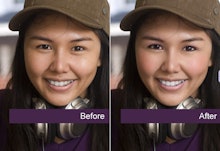What 17 Million People Are Doing to Get the Perfect Facebook Pic

The selfie world is getting competitive.
Social media typically lets us see other people in normal, silly settings, but apps like Perfect365 promote airbrushed perfection even in the images we post to Facebook and Twitter. "Selfie-help apps," which also include FaceTune, ModiFace, Pixtr and Visage Lab, turn people with smartphones into Photoshop wizards: They can whiten teeth, make themselves thinner, get rid of wrinkles, and perfect skin.
According to the Huffington Post, Perfect365 has been downloaded nearly 17 million times. In the app's gallery and Facebook page, you can see the befores and afters of its "one tap makeovers."
Perfect365 writes, "Don't let an overly-weathered look compromise the pictures you've taken...with online photo mastering, you can smooth your complexion, eliminate wrinkles, and correct the consequences of harsh lighting. Make your face glow with a youthful, radiant light, and make sure every photo of you is the best photo of you!"
"With Perfect365, you can forget all about your minor imperfections ... [U]se our digital photo mastering software to wipe away all those unwanted attributes, smooth your complexion, and remove the tell-tale signs of age and exhaustion!"
Images via Perfect365's Facebook page.
These apps try to make modifications in subtle ways that don't tip off the viewer that the photo has been edited, further promoting an unrealistic idea of what people look in everyday life.
"Unlike the previous generation of portrait-editing apps, which left figures with the two-dimensional masks of anime characters, these apps, like the best plastic surgeon, leave few obvious marks," the Huffington Post reports.
While Perfect365 is free, many selfie-help users in Japan, Thailand, and Taiwan are actually paying to perfect their pictures. BeautyPlus, the No. 1 photo app in those countries, is priced at $1.99 and allows the user to transform his or her image via a slimmed-down face, smoother pores, and brighter eyes.
In a world where Photoshop can be used to change human beings beyond recognition and the results will still make it to the cover of a magazine, the abundance of these beauty-enhancing apps is hardly surprising. It was only a matter of time until this kind of technology made its way to the masses. Will selfie-help apps, which have primarily female users, further promote a culture that demands unattainable perfection, even in simple snapshots? Probably. Will they continue to blur the line between fact and fiction in social media, which already allows people to pick and choose what they reveal about themselves? Absolutely.
Now I just await the day when a friend uploads a photo where he or she is as unrecognizable as this model.